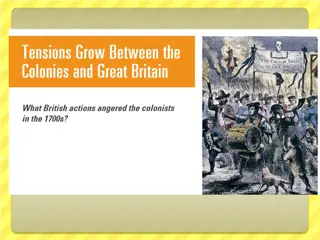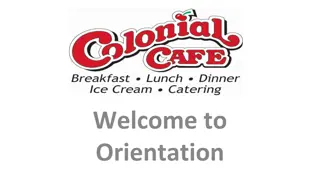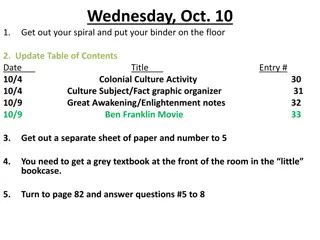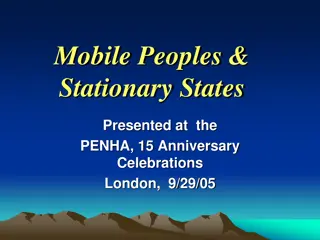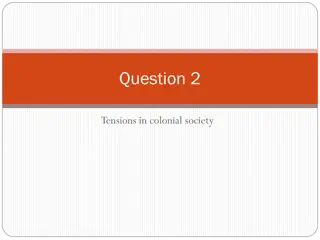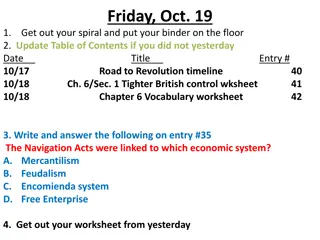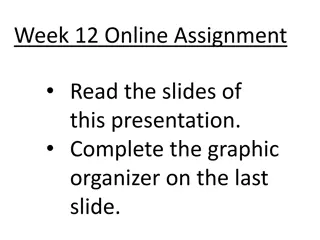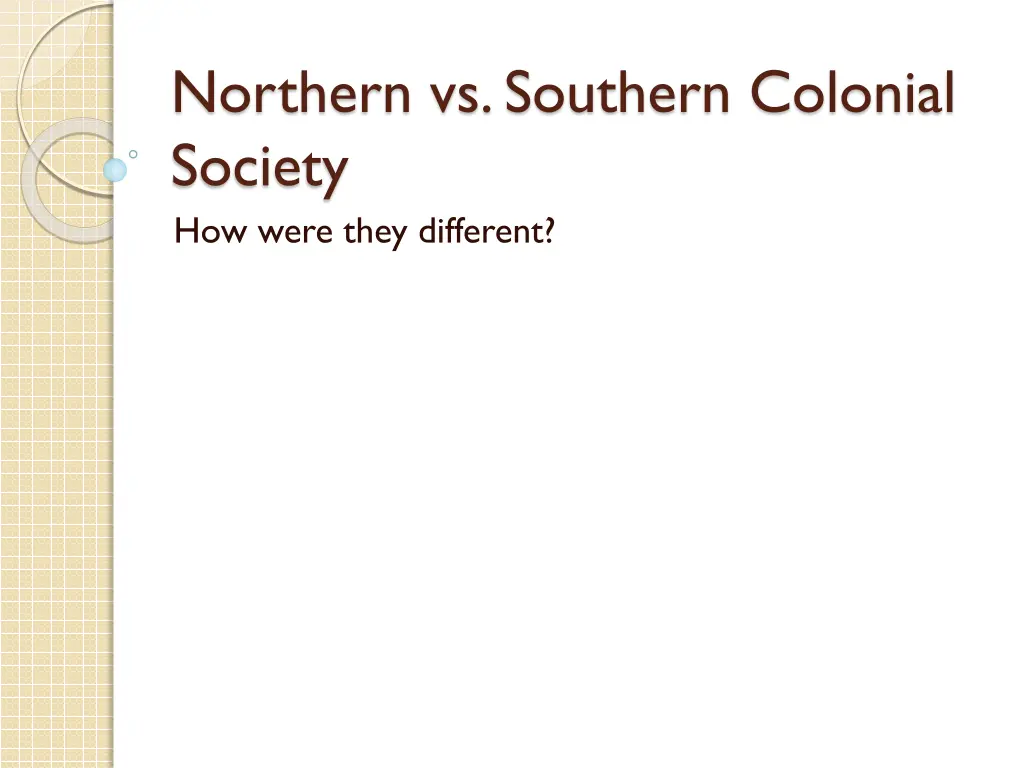
Colonial Society Differences: North vs. South
Discover the contrasting social structures of Northern and Southern colonial societies in America, characterized by economic activities, labor systems, and slave trade practices. Explore the unique developments such as tobacco production in Virginia, rice cultivation in South Carolina, and the distinctive societal dynamics that shaped each region's path. Uncover the complexities of indentured servitude, perpetual black servitude, and slave relations, shedding light on the challenges faced by diverse populations. Witness historical events like the Stono Rebellion and the establishment of New England towns, reflecting the divergent paths of colonial settlements in the North versus the South.
Download Presentation

Please find below an Image/Link to download the presentation.
The content on the website is provided AS IS for your information and personal use only. It may not be sold, licensed, or shared on other websites without obtaining consent from the author. If you encounter any issues during the download, it is possible that the publisher has removed the file from their server.
You are allowed to download the files provided on this website for personal or commercial use, subject to the condition that they are used lawfully. All files are the property of their respective owners.
The content on the website is provided AS IS for your information and personal use only. It may not be sold, licensed, or shared on other websites without obtaining consent from the author.
E N D
Presentation Transcript
Northern vs. Southern Colonial Society How were they different?
South VA 1619 annual tobacco production 20,000 pounds 1688 18 million pounds After 1690 rice became staple crop in SC Economy: land was plentiful and laborers were scarce One major port Charles Town (SC)
South Never had to have a city of any size as center of commerce due to waterways of Chesapeake Indentured servitude made up of white settlers outside New England
Perpetual Black Servitude First brought from sugar-producing colonies in Brazil and Caribbean Worked with indentured servants At first they could earn money on the side and buy their freedom Enslaved Africans in 17thcentury had more independence than later generations
Slave Trade Demand for slaves grew Captured by ruthless traders in Africa Jammed into slave ships 1 out of 7 died in ship on way over Slave trade visual: http://www.slate.com/articles/life/the_hist ory_of_american_slavery/2015/06/animat ed_interactive_of_the_history_of_the_at lantic_slave_trade.html
Slave Relations Wanted field hands Many new slaves were young males who knew nothing about European culture Resisted work orders, ruined crops, ran away (can you blame them though?) Slave religion Centered on theme of deliverance
Stono Rebellion September 1739 20 slaves gathered in Charles Town guns and weapons; killed several planter families White militia formed Many slaves died fighting; others were executed Between 1736-1801: 1,279 enslaved men and women fled More harsh slave laws put in place
North Puritans transformed English village to New England town Township grant given to organized groups Hard lives Growing season short rocky soil Would produce several crops instead of one like the South Wheat, corn, cattle, hogs
New England and the Sea Sea for livelihood Most important maritime center Whales oil for lighting Fisheries Goods profitably exported to Europe Lesser grades of fish went to West Indies to slaves Encouraged shipbuilding = commerce
Materialism Materialism and cosmopolitanism developed Clashed with Puritan beliefs Material growth = characterizes New England colonies Abundant forests Grinding wheat
Shipbuilding Prized by European traders 1/3 British ships made in colonies One of colonial America s first big industries: timber, sawmills, fisheries, taverns Commercial network trade Traded with British and British West Indies Illegally traded as well (What countries do you think?)
After 1660 To protect England s agriculture and fisheries: Placed prohibitive duties (aka what?) on certain major exports. What exports do you think? Bought more from England than they sold unfavorable balance of trade. What effect would this have on the colonies?
Solved problem in 2 Ways Used their own ships and merchants Avoided invisible charges for trade and transport Found other markets for staples that excluded from England
Triangular Trade New Englanders shipped rum to the West Coast of Africa Took slaves on the Middle Passage to West Indies Returned home with various commodities, including molasses, from which they manufactured rum
Inflation Shortage of hard currency Inflation began
New England Churches Each town had to support a church How do you think this was done? Every household had to attend midweek and Sunday religious services Take a guess: how many sermons do you think New Englanders heard in their lifetimes?
New England continued Growing materialism strained church discipline 1691 Massachusetts royal charter Required toleration of dissenters and based right to vote on property rather than church membership
Slavery in the North Slavery did exist in New England and extensive through Middle Colonies NE greater legal standing than other places in the colonies Considered less than human beings Couldn t hold weapons; had no laws to protect them Slave uprising in NY in 1712
Women in the North Few legal rights Could not vote, enter into contracts, buy/sell property, or keep their pay if they worked outside home Single women or widows could run their own business
Middle Colonies Diversity Pluralism Crops more bountiful than NE Better land Longer growing season Surpluses of food went to south and West Indies
Middle Colonies Continued Philadelphia became largest city (which city did it top?) Parks, Police Patrols, Paved Streets, Whale-Oil Lamps Lots of garbage Hard to come by firewood and clean water Headright system Germans
Taverns More taverns than any other business Most important social institution 1690 54 taverns in Boston Half operated by women
Women in the South 2ndclass citizenship Could not vote or preach Taught only basics of reading, writing, math In charge of cooking, sewing, embroidery Outside milked cows, slaughtered animals, tending to the garden Planter class servants handled household chores

